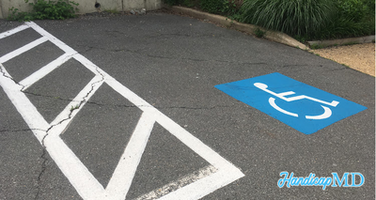
Unveiling the Rules and Regulations of Using a Handicap Placard in Michigan
Navigating life with a disability presents unique challenges, particularly when it comes to mobility and accessing public spaces. For individuals in MI, having a disability tag (also known as a placard or permit) offers essential benefits, such as the ability to park in designated accessible spaces, often located near building entrances. These accessible parking spaces can make a world of difference in providing individuals with disabilities the freedom to access important places like hospitals, grocery stores, and other public venues more easily.
However, with these privileges come responsibilities. Understanding the rules and regulations governing the use of handicap placards in Michigan is critical to avoid potential fines and penalties. This article will explore the different types of disability tags available in MI, outline the eligibility criteria, detail how to apply for a tag, and provide guidance on how to use your disability tag properly. We’ll also address some frequently asked questions to ensure you’re fully informed about how disability tags work in MI.
What Is a Handicap Placard in Michigan?
Definition and Purpose of a Disability Tag
A disability tag (also referred to as a placard or permit) is a special parking permit issued by the Michigan Secretary of State (SOS) to individuals with qualifying disabilities. The primary purpose of a disability tag is to provide easier access to public spaces by allowing the holder to park in designated accessible parking spaces. These spaces are typically wider than standard spaces and located near entrances to buildings, which helps individuals with mobility impairments navigate public areas with greater ease.
Disability tags are designed to be used by the individual to whom they are issued, and they can be used in any vehicle, regardless of whether the person with the disability is the driver or a passenger. The tag is displayed on the vehicle’s rearview mirror or dashboard and must be clearly visible to parking enforcement officers. In MI, the disability tag is available as both a tag and a license plate.
Types of Disability Tags in Michigan
MI offers several types of handicap permits to accommodate different needs:
- Permanent Disability Tag: Issued to individuals with permanent disabilities that are unlikely to improve. This tag is valid for up to four years and must be renewed before expiration.
- Temporary Disability Tag: Designed for individuals with temporary disabilities, such as those recovering from surgery or an injury. These tags are valid for a maximum of six months and can be renewed if necessary.
- Disability License Plates: For individuals with permanent disabilities, MI also offers disability license plates, which provide the same parking privileges as tags but are permanently attached to the vehicle.
- Disabled Veteran License Plates: These are available to veterans who have a service-related disability and provide the same parking privileges as other disability plates.
Who Is Eligible for a Handicap Placard in Michigan?
Eligibility for a disability tag in MI is determined by specific criteria laid out by the state. These criteria help ensure that only individuals who genuinely need the assistance can access these parking accommodations.
Medical Conditions That Qualify
To qualify for a disability tag in MI, an individual must have a medical condition that significantly limits their ability to walk or engage in normal activities. Common qualifying conditions include:
- Inability to walk more than 200 feet without stopping to rest.
- Use of mobility aids such as a wheelchair, walker, crutches, or cane.
- Severe lung disease that affects breathing.
- Cardiac conditions classified as Class III or Class IV by the American Heart Association.
- Arthritis, neurological, or orthopedic conditions that limit mobility.
- Dependence on portable oxygen.
Applicants must provide medical certification from a licensed healthcare provider, such as a physician, chiropractor, or podiatrist, to verify that they meet the eligibility criteria.
Permanent vs. Temporary Disability Tags
- Permanent disability tags are issued to individuals with long-term or permanent disabilities that are not expected to improve. These tags are valid for four years and must be renewed before expiration.
- Temporary disability tags are for individuals with temporary mobility impairments and are valid for a period of up to six months. If the individual’s condition persists beyond six months, they may apply for a renewal or switch to a permanent tag if necessary.
How to Apply for a Handicap Placard in Michigan
Applying for a disability tag in MI is a straightforward process, but it requires proper documentation and certification from a healthcare provider. Here’s a step-by-step guide to help you through the application process.
Step-by-Step Application Process
Obtain the Application Form: Download the Application for a Disability Parking Placard (Form BFS-108) from the state Secretary of State (SOS) website or pick up a copy at your local SOS office.
Complete the Personal Information Section: Fill in your personal details, including your name, address, and driver’s license or identification card number.
Get Medical Certification: A licensed healthcare provider must complete the medical certification section of the form, verifying that you meet the eligibility requirements for a disability tag.
Submit the Application: Submit the completed application in person or by mail to your local SOS office. Be sure to include all required documentation.
Receive Your Disability Tag: Once your application is processed, you will receive your disability tag by mail or in person, depending on how you submitted your application.
Required Documentation and Medical Certification
When applying for a disability tag, you will need to provide the following:
- A completed Application for a Disability Parking Placard (Form BFS-108).
- Proof of identification, such as a MI driver’s license, state ID, or passport.
- Medical certification from a licensed healthcare provider.
Cost of Obtaining a Disability Tag
One of the benefits of the disability pass program in MI is that there is no fee for either temporary or permanent disability tags. The state waives the cost to ensure that all eligible individuals have access to this important service. However, if you are applying for a replacement pass or renewing a tag, there may be a small administrative fee in some cases.
Rules and Regulations for Using a Handicap Placard in Michigan
Once you’ve received your disability tag, it’s important to follow the rules and regulations that govern its use in MI. Proper use of the tag ensures that you can legally park in accessible spaces without facing fines or penalties.
Proper Display of the Tag
Your Michigan disabled permit must be clearly visible when parked in an accessible space. It should be hung from the rearview mirror with the front side facing outward so that the expiration date and permit number are easily visible to law enforcement or parking enforcement officers.
- Remove the tag when driving: MI law requires that you remove the disability pass when the vehicle is in motion to avoid obstructing your view.
Shared or Borrowed Tags
Only the person to whom the tag was issued may use it. It is illegal to lend your tag to someone else, even if they are using your vehicle. The individual with the disability must either be driving or a passenger in the vehicle when the tag is in use.
Non-Eligible Drivers
If someone without a qualifying disability uses your disability tag, even with your permission, it is considered a violation of MI law and can result in fines for both the tag holder and the driver.
Where You Can Park with a Disability Tag
Disability tag holders have the right to park in specially designated handicap-accessible parking spots. These spaces are usually located close to the entrances of public buildings, shopping centers, medical facilities, and other venues.
Designated Accessible Spaces
In MI, only vehicles with properly displayed disability tags are permitted to park in spaces marked by a wheelchair symbol. These spots are often wider than standard parking spaces to accommodate vehicles with ramps or lifts for wheelchairs.
Time Limits and Parking Meters
MI law also allows individuals with a disability tag to park for up to 24 hours in a metered space without being required to pay the meter fee. However, local regulations vary, and it's essential to check signs or confirm local ordinances before assuming meter exemptions.
Parking on Private Property
Though disability tags provide parking benefits on public property, private establishments (such as shopping malls or apartment complexes) are not always required to comply with the same parking regulations. Some private properties may enforce their own rules, and it’s advisable to inquire before parking on private premises.
Situations Where a Disability Tag Cannot Be Used
While a disability tag provides valuable parking benefits, it cannot be used in all situations. You cannot use a disability tag to:
- Park in no-parking zones.
- Park in fire lanes or spaces designated for emergency vehicles.
- Park in spaces reserved for other purposes, such as loading zones or restricted access areas.
- Allow someone else to use your tag if you are not in the vehicle. The person to whom the tag was issued must be present in the vehicle for the tag to be valid.
Penalties for Misusing a Disabled Permit
Disability tags come with significant benefits, but they must be used responsibly. Misuse of a disability tag can result in fines, penalties, and the loss of parking privileges.
Fines and Legal Consequences
In MI, common forms of disability tag misuse include:
- Using someone else’s tag when the individual to whom the tag was issued is not in the vehicle.
- Parking in an accessible space without displaying a valid disability tag.
- Using an expired or counterfeit tag.
Violations can result in fines of up to $500, and in some cases, vehicles parked illegally in accessible spaces may be towed. Repeat offenders or those caught using a counterfeit or altered disability tag may face additional legal consequences, including criminal charges.
How to Report Misuse of a Disability Tag
If you witness someone misusing a disability tag, such as parking in an accessible space without displaying a valid tag or using a tag that belongs to someone else, you can report the violation to local law enforcement or parking enforcement authorities. Reporting misuse helps ensure that disabled parking spaces remain available for those who truly need them.
Renewal and Replacement of Disabled Permits
Expiry Dates
Permanent disability passes in MI are valid for four years, while temporary passes are issued for six months. If your condition persists beyond the expiration of a temporary pass, you may reapply for a new tag with updated medical certification.
How to Renew
Permanent passes must be renewed every four years. The Secretary of State will typically send a renewal notice by mail before the expiration date. Renewal can be done by mail or in person, and for permanent passes, medical recertification is not required unless the state requests it.
What to Do if Your Tag is Lost or Stolen
If your disability tag is lost, stolen, or damaged, you can request a replacement by filling out the necessary forms at your local Secretary of State office. There may be a small fee for replacing a lost or stolen tag, but the process is generally quick and straightforward.
How to Replace a Lost or Stolen Disabled Permit
If your handicap placard is lost or stolen, you can request a replacement from the state SOS. To replace a lost or stolen disability tag, follow these steps:
- Complete a new application for a disability parking tag (Form BFS-108).
- Submit the application to your local SOS office, either in person or by mail.
- Receive your replacement tag: Once processed, the SOS will issue a replacement tag.
There is typically no fee for replacing a lost or stolen disability tag, but it’s important to report the loss or theft as soon as possible to prevent misuse of your tag.
Rights and Responsibilities of Disabled Permit Holders
Know Your Rights
Disability tag holders have the right to use designated parking spaces, receive meter exemptions, and enjoy other accommodations. However, these rights are not unlimited. Always make sure that you are following the local rules and guidelines to avoid penalties.
Responsibilities of Tag Holders
In addition to your rights, you are also responsible for using your tag ethically. Never share your tag with someone who is not eligible, and always ensure that it is displayed properly while parked.
Recent Updates to Michigan's Disability Tag Laws
MI frequently updates its disability parking regulations to improve accessibility and reduce fraud. As of recent years, the state has implemented stricter enforcement against the misuse of disability passes and increased fines for violations. It is advisable to stay informed about any new laws or amendments that may affect your use of the disability tag.
Frequently Asked Questions (FAQs)
1. Can I use my MI disability tag in other states?
Yes. Disability tags issued in MI are recognized in all other U.S. states under the Americans with Disabilities Act (ADA). However, parking regulations may vary by state, so it’s important to check the local rules when traveling, especially regarding metered parking and time limits.
2. Can I let someone else use my disability tag?
No. Disability tags are issued to individuals, not vehicles. This means that the person to whom the tag was issued must be present in the vehicle for the tag to be used. Allowing others to use your tag without you being in the vehicle is illegal and can result in fines and penalties.
3. How long is a temporary disability tag valid?
Temporary disability tags in MI are valid for up to six months. If your condition persists beyond this period, you can apply for a renewal or switch to a permanent tag if your disability becomes long-term.
4. What should I do if my disability tag is damaged?
If your disability tag becomes damaged, you should apply for a replacement by submitting a new application to the state SOS. Be sure to include any damaged portions of the old tag with your application.
5. Do disability tag holders have to pay parking meters?
In some municipalities in MI, disability tag holders are exempt from paying parking meter fees. However, this benefit varies by location, so it’s important to check the specific regulations in the city or town where you are parking.
6. Can I park in a no-parking zone with a disability tag?
No. Disability tags do not grant permission to park in no-parking zones, fire lanes, loading zones, or other restricted areas. The tag only allows parking in designated accessible spaces.
Conclusion
Having a handicap placard in Michigan provides essential benefits that enhance mobility and access to public spaces for individuals with disabilities. Whether you are applying for a temporary or permanent tag, understanding the rules and regulations surrounding the use of your disability tag is critical to ensuring that you use it legally and responsibly.
By properly displaying your tag, following the rules for parking in designated accessible spaces, and renewing your tag before it expires, you can take full advantage of the benefits of your disability tag without the risk of fines or penalties. Disability tags are more than just parking permits—they’re an important tool that helps individuals with disabilities navigate their communities with greater ease and independence.
.png)






